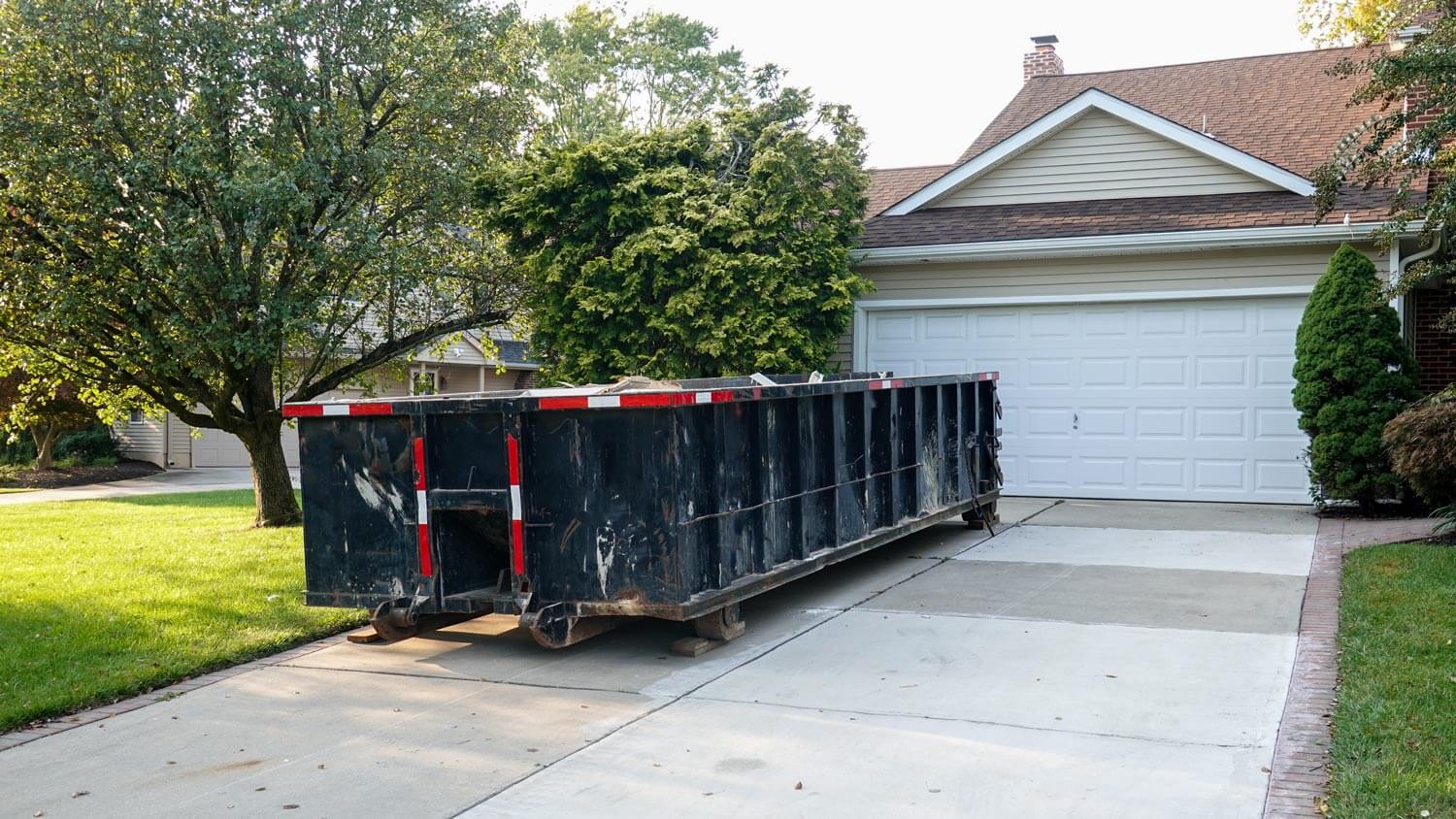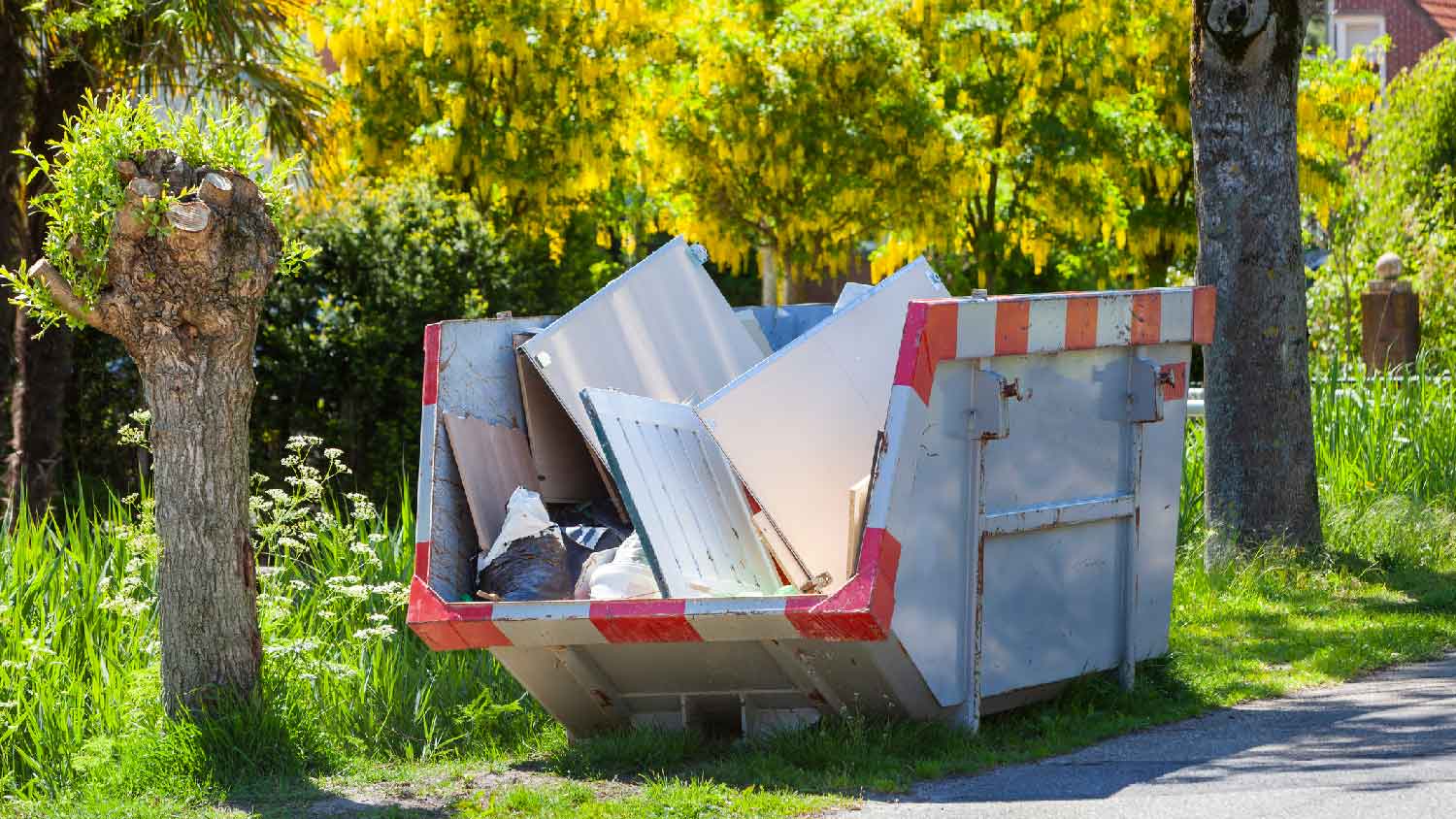How to Rent a Dumpster Step-by-Step
Take control of your trash by renting the right dumpster


The amount of waste from your project will determine the right size and type of dumpster you need.
Dumpster rental companies will often determine the cost based on the waste volume, rental period, and the time of year.
Research permits in your area before renting a dumpster or determining what to throw away.
When you’re working on a large DIY project, you might end up with a lot of waste that won’t fit in your regular garbage bins. Wouldn’t it be nice to have a temporary dumpster rental to throw out the waste and have it hauled away? Here’s how to rent a dumpster, from determining the size you need to secure, necessary permits, and more.

1. Estimate Amount of Waste
Before you rent a dumpster, you’ll want to make sure you know how much waste you’ll be tossing. If you haven’t started demolishing those old kitchen cabinets, estimate the amount of waste you’ll have afterward.
If you’ve already started ripping up the old floors in the bathroom, gather all the waste in one spot to see how much you have. Plus, you could save money and hassle if you have only a few heavier items by opting for junk removal versus a dumpster rental.
2. Choose Dumpster Size and Type
Once you know how much garbage you need to get rid of, you can appropriately choose the correct dumpster size. Sizes can range from company to company, but options can include anywhere from 10 cubic yards (which will hold about 50 trash bags’ worth of waste) to 40 cubic yards (up to 250 trash bags’ worth).
Choosing the correct size is important—too small, and you’ll need to rent an additional dumpster. Too large, and you’ll have spent unnecessary money on wasted space.
When you’re exploring dumpster rental options, it’s helpful to know the difference between the two main types of dumpsters as well: front-load and roll-off.
Front-Load
Front-load dumpsters get their name because they require front-load trucks with hydraulic arms. Because they require special handling and maneuvering, this dumpster variety is often used in permanent settings. They’re ideal for restaurants, retail spaces, and property management since they hold up to about 1,600 pounds of waste and don’t move around much.
Roll-Off
Roll-off dumpsters hold a much higher amount of waste, in some cases upwards of 12,000 pounds. They are large, open-topped containers and ideal for large debris projects, such as construction, major home cleanup, yard cleanup, junk removal, and more. These are more commonly rented or used in temporary settings as they are more mobile.
"Opting for the appropriate size dumpster is crucial for cost savings. Renting a smaller dumpster than necessary might result in overflow fees, while renting a larger one wastes money on unused space. Working with a reputable professional often ensures a team that can help customers determine the ideal dumpster size for their project."
— Sean Foley, President of redbox+ Dumpsters
3. Get a Permit

Yes, you might need a permit to rent a dumpster. It all comes down to where that dumpster will be placed during use. If you can keep it in your driveway or elsewhere on your own property, you likely will not require a permit. But if you have to place the dumpster in the street or other public space, you’ll likely need a permit.
To request a permit, visit your city’s website and search for a dumpster permit request form, or call to inquire about the process to obtain a permit. Fill out the necessary forms and submit them for approval.
It’s best to look into this permitting process ahead of time, as some city departments could take as much as two weeks to process the permit request. That’s a long time to wait with a pile of waste taking over your home or garage.
4. Get Quotes
Search for local dumpster rental companies and call around for quotes. The previously gathered information, like the amount of waste, the size of the dumpster, and necessary permits, will help you track down the best quotes suited to your needs. Prices range anywhere from $290 to $500, depending on the size of the dumpster and the rental period.
5. Check Reviews
While you’re exploring how to rent a dumpster, don’t forget to check reviews. While the dumpster rental process is pretty straightforward, you’ll want to make sure you’re not hit with unexpected or hidden costs. You’ll also want to make sure the rental company has excellent communication and offers timely pickups and deliveries.
6. Find Out the Rental Period
You can expect to pay the same price for a dumpster rental, whether you need it for one day or a week. But after one week, you might have the option to rent for up to a month at a time. Alternatively, companies might charge $10 per day after one week has passed, in addition to the first week’s fee.
The final cost to rent a dumpster depends on the company. Charges can vary widely based on the amount of time you need the dumpster. Be sure to closely review the rental periods and associated costs to choose the dumpster rental that works best for you.
7. Consider Weight Limits
Dumpsters have weight limits. The standard 10-cubic-yard dumpster can hold a maximum of 1 or 2 tons of waste, while the 40-cubic-yard dumpster will hold up to 6 tons of waste.
Tossing heavier items, like broken concrete or bricks, could require a special, heavy-duty dumpster. Plus, the weight of the waste will incur dump fees, which are set by your city. You’ll likely spend $20 to $100 per ton of waste.
8. Know What You Can Put in a Dumpster
You can’t just dump anything into a dumpster rental. Items like household paints, old appliances, chemical cleaners, motor oil, and tires cannot go into a dumpster, but you still have plenty of options. A few examples of items you can put in a dumpster include most furniture, construction debris without hazardous chemicals, textiles, and some landscaping materials (depending on your agreement). You will need to consult with the dumpster rental company and your municipality to determine how to properly dispose of hazardous waste.
You can't just throw anything into a dumpster rental. Fluorescent light bulbs, paint, tires, household cleaners, and food waste are just a few commonly prohibited items. Ask dumpster rental companies what you can and can't throw into their dumpsters before renting.
9. Pick Your Dumpster Placement and Prepare Your Space
There are tricks to choosing the best dumpster placement for your project, whether you choose the street, driveway, or the lawn. Always begin by checking your permit instructions and local regulations regarding where your dumpster can go. In most cases, you must keep dumpsters at least six feet from surrounding structures. On the other hand, place your dumpster close enough to your project site for easy loading.
Your dumpster company may also offer tips on how to prepare for the dumpster's arrival. When placing it on a soft surface such as a lawn, you may need to lay down plywood for stability. The company may also recommend traffic cones. Most importantly, ensure the drop-off area has at least six feet on all sides.
Cost to Rent a Dumpster vs. Hiring a Junk Removal Pro
The cost to rent a dumpster depends on the type of dumpster, its size, and the length of the rental period. Front-load dumpsters require a contract for an extended period, while you can rent roll-off dumpsters as needed. The average cost of a roll-off dumpster rental is $200 to $800 per week.
If you don’t want to deal with dumpster drop-off and pickup, you can hire a junk removal service near you. The removal team will come to your house, pick up your garbage, and dispose of it appropriately. Junk removal costs between $150 and $450, depending on the amount of junk you need removed.
Frequently Asked Questions
There are several types of small dumpsters that you can rent, and they all vary slightly in size. Roll-off dumpsters are typically between 10 and 12 yards and are among the most common and convenient options because you can simply roll off your trash rather than removing it by hand. Commercial dumpsters range from 2 to 10 yards in size and are often used to collect daily trash. Finally, bag dumpsters are the smallest option you have at 2 to 5 yards, but they’re also the most inconvenient because you have to personally carry them on and off your truck.
A dump trailer consists of an open box bed with a short barrier that’s equipped with wheels and can be easily attached to a vehicle for transportation. This option is a favorite because it’s easy to navigate to and from destinations and is ideal for hauling small waste quantities. On the flip side, a dumpster may not have such features and will need to be loaded onto rather than attached to a vehicle to get it where you want to go. Check out the cost to rent a dump trailer or even the cost of junk removal when deciding between your options.















